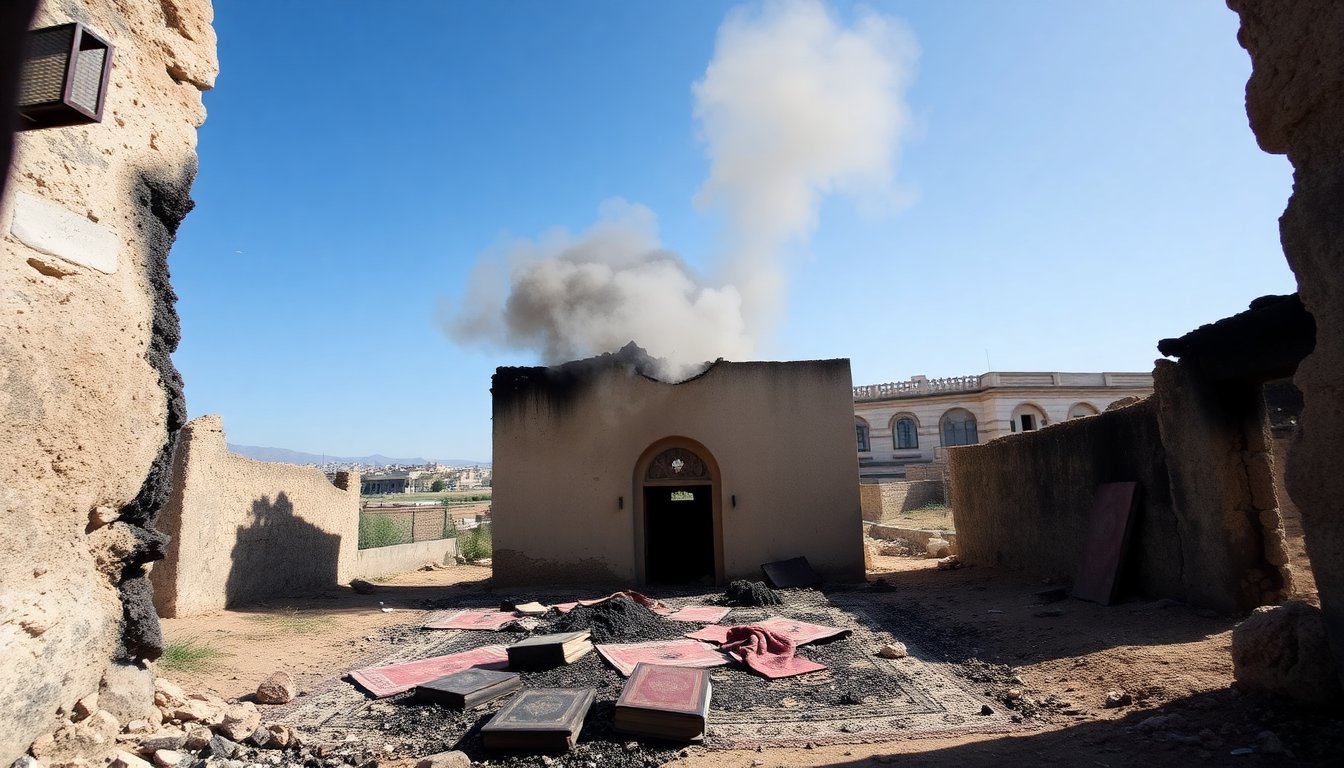Table of Contents
In a troubling incident that underscores the ongoing conflict in the region, Israeli settlers set fire to a mosque in the Palestinian village of Deir Istiya, located in the central West Bank. This act of vandalism occurred just a day after some Israeli officials condemned violence perpetrated by settlers against Palestinians. Witnesses reported that the mosque’s walls were charred, with several copies of the Qur’an and carpets destroyed in the blaze.
The graffiti left behind by the perpetrators conveyed a chilling message, with phrases such as “we are not afraid” and “we will revenge again” scrawled in Hebrew. This defiance appears aimed at military leaders like Maj. Gen. Avi Bluth, who had recently voiced his concerns over settler violence. In light of these events, the Israeli military has stepped in, stating that they are investigating the incident, although no suspects have been identified as of yet.
Background of settler violence
Attacks by Israeli settlers on Palestinian properties have become disturbingly common, raising alarm among military officials and international observers. The recent incident is not an isolated case; rather, it fits into a broader pattern of escalating violence that has spanned over several decades. Critics, including human rights organizations, argue that the violence is not merely the actions of a few rogue individuals but reflects a systemic issue that is often overlooked or insufficiently addressed by the Israeli government.
Official responses and implications
In response to the attack on the mosque, Israeli President Isaac Herzog described the incident as both “shocking and serious,” highlighting the need for decisive action against such violence. Herzog’s role, although primarily ceremonial, positions him as a moral authority in Israel, and his comments are significant in the context of rising tensions. He urged all state authorities to take serious measures to address the growing phenomenon of settler violence.
Furthermore, the Chief of Staff of the Israeli army, Lt. Gen. Eyal Zamir, echoed these sentiments, emphasizing the military’s commitment to combating violent acts by settlers. He indicated that such behavior is contrary to the values of the Israeli public and detracts from the military’s primary responsibilities. Despite these statements, the reality on the ground suggests a deepening crisis, with little accountability for those committing acts of violence against Palestinians.
The historical context of violence
The mosque in Deir Istiya is no stranger to violence, having suffered attacks as far back as 2012 and 2014. Such incidents have increased sharply since the onset of the Gaza conflict two years ago, with October marking the highest recorded number of settler attacks in the West Bank since monitoring began in 2006. The United Nations Office for the Coordination of Humanitarian Affairs (OCHA) has reported that thousands of Palestinians have been displaced due to settler violence and access restrictions in recent years.
Currently, the situation is exacerbated by the Israeli government’s support for the settler movement, which is heavily influenced by far-right factions. Figures such as Finance Minister Bezalel Smotrich and Minister of National Security Itamar Ben-Gvir have been instrumental in shaping policies that favor settlement expansion, further contributing to the tensions in the region.
Challenges faced by Palestinians
The rise in settler violence is viewed by many Palestinians as a deliberate strategy to dispossess them of their lands. As new settlements emerge, often comprising little more than basic structures and livestock pens, the encroachment onto Palestinian agricultural land and water sources becomes increasingly apparent. The situation is further complicated by the perception that Israeli law enforcement fails to adequately address these crimes, as indicated by statistics showing that a vast majority of investigations into settler violence end without any charges.
The cycle of violence is not only a humanitarian crisis but also a significant obstacle to peace in the region. As international observers look on with concern, the lack of accountability and the systemic nature of the violence continue to hinder any prospects for reconciliation between Israelis and Palestinians.
In conclusion, the recent attack on the mosque in Deir Istiya is emblematic of a larger issue of settler violence that has persisted for decades. Without decisive action from Israeli authorities and a commitment to accountability, the cycle of violence is likely to continue, further complicating an already fraught situation.


